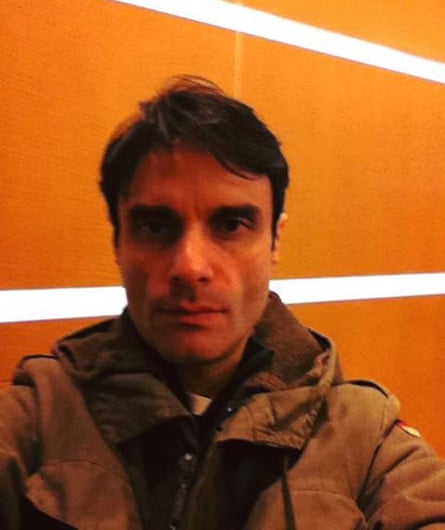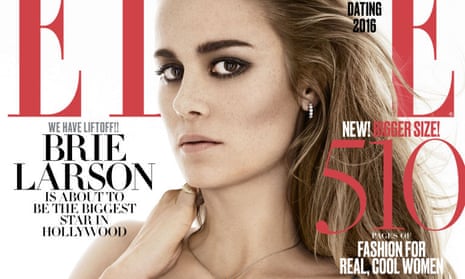Last week, a freelance reporter with a thirst for public revenge decided to take on the insular New York media world. Predictably, his writing went viral.
Jacques Hyzagi unleashed a vicious torrent of insults targeting Elle magazine editors who, he argued, butchered his interview with Comme Des Garçons designer Rei Kawakubo.
In the piece, published in the New York Observer, he then went on to target the Atlantic (“boring”), Politico (“vapid”), New York magazine (“bores”) and New Yorker editor David Remnick (“nice, but he’s no William Shawn”).
But just who is Hyzagi to be such an arbiter of taste? And why is his online presence so limited?

We met at the local Starbucks in East Hampton on Friday night (Hyzagi lives in Manhattan, but is staying with friends right now). He was running 40 minutes late due to back and leg injuries from a motorbike accident a week earlier, which left him with a limp. Upon arrival, he asked me to turn my computer and phone off – and watched to ensure both went blank – and banned my use of a voice recorder.
I asked him why he’s keen to take such precautions. “This thing has exploded in such a way. It’s a sensitive time, a sensitive issue.” Dressed in sweatpants, he said he hadn’t slept in two days. “I was attacked in a very vicious way. I’m insulted every five minutes … I’m taking grenades from Iraq,” he said, referring to someone from Iraq who insulted him in Twitter.
He fidgeted, breaking apart a coffee stirrer into little pieces. His story got coverage in the New York Post, Hollywood Reporter, Jezebel and multiple fashion blogs, but clearly it wasn’t the reaction he was expecting.
“Why are people taking the side of the powerful figures I attack? There is a rush to conformity here I find puzzling,” he said. “Aren’t you supposed to question authority and establishment?”
His article, he said, is a conversation starter about ethics in journalism. In the piece, he claimed that Elle allowed Comme des Garçons to edit the interview as they wanted, turning it into a puff marketing piece rather than a hard-hitting interview. “Are we journalists here or are we corporate shills?” he asked.
He thinks people aren’t taking his side because he upset “the chain of command” by insulting editors. He also reckons he’s pissed off a lot of reporters because they think he’s come out of nowhere and hasn’t paid his dues.
Hyzagi spoke with a heavy French accent but said he has lived in New York for decades. He conveyed an air of international man of mystery – but that’s mainly because he refuses nearly all personal questions. “I’m afraid you’re trying to psychotherapy me,” he replied when I asked about his life.
He did tell me he grew up in Paris and worked in the offices of Charlie Hebdo as a teenager. He said he learned about journalism ethics while making documentaries for his master’s at NYU Tisch School of the Arts (a spokesperson from NYU said Hyzagi enrolled in the MFA film program in 1992, but dropped out before the end of the first term). He said he received his PhD in art history from the Sorbonne.
A self-proclaimed anarchist, he thinks that a backlash focusing on his personality means those in the media can ignore his larger concerns about the state of journalism.
“To portray me as a freak makes the system work. If they know I’m this average schmuck, it would scare the shit out of them,” he said.
And yet, how does an average schmuck with little media experience (he’s published just nine stories with the Observer, plus the Kawakubo interviews with the Guardian and Elle) land interviews with actor Morgan Freeman, philosopher Bernard-Henri Lévy, comedian Ricky Gervais and cartoonist Robert Crumb?
After all, his first story published in the Observer was a convoluted resignation letter after leaving his role as an art history lecturer at Queensborough Community College. The second was an exclusive interview with Julian Assange, where he was flown over to London and interviewed the WikiLeaks founder at his home in the Ecuador embassy.
“It’s like asking a magician his tricks,” he replied.
Hyzagi wrote in his piece, titled Elle on Earth, that he has dated models and knows designers; I suggested perhaps those personal connections helped him land the Kawakubo interview. He laughed.
“I got to Rei by fucking a supermodel. I got to Assange by fucking a spy at MI6. I got to Ricky Gervais by fucking Stephen Merchant [Gervais’s long-time comedy collaborator],” he announced, raising his eyebrows. “The bottom line is don’t ask McDonald’s for the secret sauce”.
He added: “Only assholes would tell you they got there by hard work … you got where you are now because your daddy had a lot of money and connections, or you seized opportunities”.
So is he a Trustafarian, living off some French family money? “I can assure you, I’m not. Have you heard about AmEx?” he said, adding that he only pushed for the Elle article to be published because he needed to pay off his credit card debt he accumulated during his trip to Paris for the interview.
Although he was “uncomfortable” explaining how he’d gotten his big-name interviews, he happily discussed his time at working at Hara-Kiri – a monthly magazine by the publishers of controversial satirical magazine Charlie Hebdo which folded in 1989.
“I was a teenager, but fearless,” he said, explaining that he spent six months working on a project that never got off the ground. “I lived in the center of Paris and would go to famous writers and convince them to write for Hebdo.” He names novelist and playwright Marguerite Duras, whose home was near his. “I stalked her.”
It was the 1980s and Hyzagi spent his time writing and dreaming up wild ideas for Hara-Kiri. “I was seated next to a neo-Nazi. There was a weird leftist anarchist to my left,” he explained. “They were insane people put in a room together.”
The magazine’s founder, Georges Bernier, was “a walking nightmare but everyone loved him”. “He had no heroes and no allegiances,” said Hyzagi.
Once in the US, Hyzagi worked at small US colleges as an art history professor, which he resigned from publicly. He filed complaints with the Department of Education about being told to fake grades at Long Island University so students wouldn’t drop out, and spoke to the press about it.
Although his self-destructive streak was obvious in his viral piece, he asked if there are job openings at the Guardian. He also wanted me to put down that he’s interested in working for the Independent.
Brushing those requests aside, I asked who he’d like to interview next. He mentioned Remnick from the New Yorker (despite insulting his leadership in his piece) and Dean Baquet, executive editor of the New York Times (although he also noted that no one should trust the paper because of its reporting of the Iraq war).
Other dream interviewees include Iranian filmmaker Abbas Kiarostami, Black Lives Matter activists, Barack Obama, Hillary Clinton and Jeb Bush. I ask if any of those interviews are already being discussed. “Some things are in the process of being made,” he said.
We talked for nearly three hours, and I told him I felt I only knew the bare bones of his life because he is so cagey. That’s exactly what he wants – to make sure his critics can’t dismiss him even more. “They want to make it personal to deflect, deflect, deflect,” he said.
Most reporters are lazy and greedy, he reckons. “Corporate media: they can’t piss on it because they want a piece of it. That’s a good quote,” he said.
Starbucks closed at 10pm, and we continued the conversation outside, only leaving when his back ached too much to stand. He tried to make sure I was going to write about the “real issues” he’d raised, but then threw his hands in the air.
“Talk about what you want,” he declared with a gallic shrug.
- This article was amended on 3 April 2016 to correct Dean Baquet’s job title at the New York Times. He is the executive editor, not the managing editor.

Comments (…)
Sign in or create your Guardian account to join the discussion